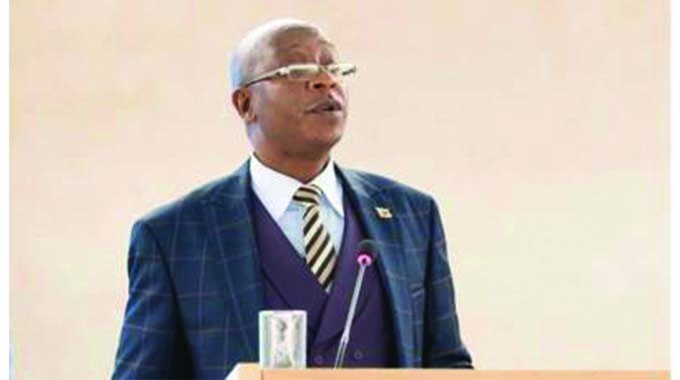No need to panic over drought: Government

Zvamaida Murwira, Harare Bureau
GOVERNMENT will not rush to declare the El Nino-induced drought a state of disaster, given that it is working on elaborate and multifaceted measures to mitigate its effects, Senators heard yesterday.
Justice, Legal, and Parliamentary Affairs Minister, Ziyambi Ziyambi said the measures include increased winter wheat hectarage for this year, utilising various water bodies in the country, drilling more boreholes and distributing food relief to vulnerable persons.
Minister Ziyambi said this during a Question and Answer session in the Senate.
Midlands Senator, Daniel MacKenzie Ncube (Zanu-PF) had asked what measures the Government was putting in place to protect people from being exploited by unscrupulous individuals, who might want to take advantage of the situation and rip them off.
“As a country, there is no need to panic or to be worried and declare a state of disaster because we have several measures to mitigate the effects. I am pleased to inform the House that we have several facilities that will help farmers with centre pivots to increase wheat hectarage. Areas where the centre pivot will be placed have already been identified. We cannot be beggars when we have several water bodies. There is no need to panic, we will be using multifaceted ways to respond to the situation,” said Minister Ziyambi.
Government, he said, will unveil both short and long-term measures to deal with the pending drought.
He said the Grain Marketing Board was holding more than 245 000 tonnes of maize because the country had been registering bumper harvests in past years, meaning some households still had grain stocks.
“As of now, we are still food self-sufficient. We had a good harvest last season, we are providing food aid to those pockets that are insecure,” Minister Ziyambi said.
GMB, he said, was paying import parity price in grain purchase from farmers thus hedging them against any possible exploitation, while millers have been allowed to import for their use.
“We are now assessing the projected harvests. What Cabinet has done is to say we have several water bodies, the immediate solution is to put a bigger area under wheat to substitute maize or barter trade,” Minister Ziyambi said.
“So at the moment, we are not panicking because we know the measures we have put in place will help and will ensure that even those with an appetite to fleece people, it will not help, we are also drilling boreholes”.
Responding to another question, Primary and Secondary Education Minister Torerai Moyo warned schools against forcing pupils under the Basic Education Assistance Module (BEAM) to pay for examination fees since that was catered for by the Government.
Mashonaland West Senator Prisca Mupfumira had asked if it was lawful for schools to force learners under BEAM to pay examination fees.
“BEAM is a social safety net for disadvantaged learners. By law, a school is not allowed to force any learner under BEAM to pay examination fees. Government pays both the tuition and examination fees. If there is any school doing that, it is violating the law,” he said.
The minister added that the Government will soon unveil a technological system in rural areas where there will be a server that does not need Wi-Fi but will help pupils access notes that would have been uploaded by their teachers using the geospatial mechanism being administered by the Ministry of Higher and Tertiary Education Innovation, Science and Technology.
This, he said, was part of measures to bridge the urban-rural divide.








Comments